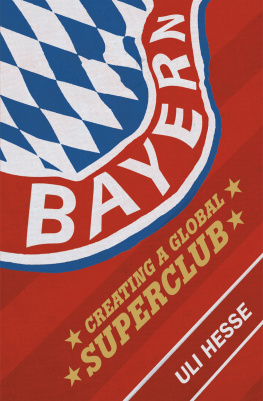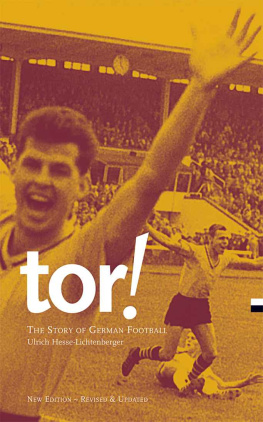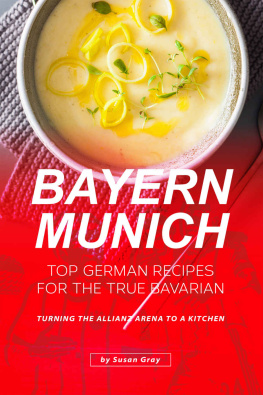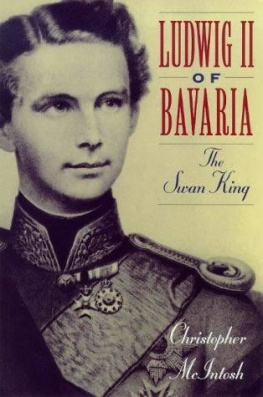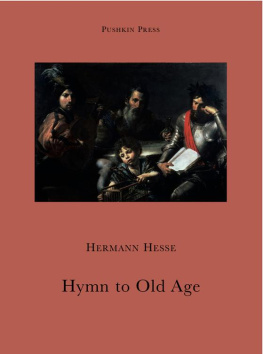Uli Hesse - Bayern: Creating a Global Superclub
Here you can read online Uli Hesse - Bayern: Creating a Global Superclub full text of the book (entire story) in english for free. Download pdf and epub, get meaning, cover and reviews about this ebook. year: 2016, publisher: Random House, genre: Detective and thriller. Description of the work, (preface) as well as reviews are available. Best literature library LitArk.com created for fans of good reading and offers a wide selection of genres:
Romance novel
Science fiction
Adventure
Detective
Science
History
Home and family
Prose
Art
Politics
Computer
Non-fiction
Religion
Business
Children
Humor
Choose a favorite category and find really read worthwhile books. Enjoy immersion in the world of imagination, feel the emotions of the characters or learn something new for yourself, make an fascinating discovery.
- Book:Bayern: Creating a Global Superclub
- Author:
- Publisher:Random House
- Genre:
- Year:2016
- Rating:4 / 5
- Favourites:Add to favourites
- Your mark:
- 80
- 1
- 2
- 3
- 4
- 5
Bayern: Creating a Global Superclub: summary, description and annotation
We offer to read an annotation, description, summary or preface (depends on what the author of the book "Bayern: Creating a Global Superclub" wrote himself). If you haven't found the necessary information about the book — write in the comments, we will try to find it.
Bayern: Creating a Global Superclub — read online for free the complete book (whole text) full work
Below is the text of the book, divided by pages. System saving the place of the last page read, allows you to conveniently read the book "Bayern: Creating a Global Superclub" online for free, without having to search again every time where you left off. Put a bookmark, and you can go to the page where you finished reading at any time.
Font size:
Interval:
Bookmark:

Bayern Munich is a team of extremes. They are the most passionately supported club in Germany and the most hated. There is no doubt that they are the most successful. Winners of twenty-four domestic titles since the late-1960s, they have stood at the pinnacle of European football for almost their entire existence.
German football is in the spotlight like never before and Bayern are at the forefront. While Germany have become World Champions, Bayern have been to the Champions League final for three of the last six years, collecting their fifth winners medal along the way and revolutionising the way they play. And theyve done it all without billionaire tycoon owners, record transfer deals, eye-watering debts or charging supporters an arm and a leg for tickets.
Through interviews with the key protagonists, Uli Hesse tells the story of this unique club. From early run-ins with the Nazis to being dubbed FC Hollywood for their egocentric stars in the 1990s up to the sensational undercover appointment of the best coach in the world, Pep Guardiola, Hesse opens the doors on Bavarias superpower and takes you inside Bayern Munich.
Uli Hesse is an expert on German football and the author of Tor! The Story of German Football, which was shortlisted for the William Hill Sports Book of the Year Award. He writes for FourFourTwo, ESPN and the Blizzard.

Be not afraid of greatness:
Some are born great,
Some achieve greatness,
and some have greatness thrust upon em
William Shakespeare, Twelfth Night
The moneys rarely great and the working hours are often an imposition, but writing about football is still the best job in the world. Unless, that is, you have to talk to a player who is suffering from a major injury.
Such players are usually grumpy, sometimes even in a foul mood. They hate not being able to play. They fear they will lose their place in the team. They are bored with all those long hours spent in the company of physios. They miss the dressing-room camaraderie. They are irritable in a way we all would be irritable if we were scanning our bodies for small signs of improvement every waking minute.
So I braced myself for the worst when the door opened and into the room stepped a footballer who had been sidelined by a broken ankle for more than three months. I neednt have worried. Philipp Lahm wore a very broad grin as he extended a hand to say hello.
In fact, the captain of Bayern Munichs 2013 Champions League-winning side (and the captain of Germanys 2014 World Cup-winning team) was in such a jolly mood that we both forgot we were supposed to talk about football. Instead we spoke about his latest passion, golf, and then I asked him if it was true that he had a snooker table at home. He said it was, which sparked a discussion about eight-ball pool versus snooker.
Then I remembered something.
Oh, I said, I almost forgot to send greetings and best wishes from Franz Roth.
Bayern have boasted a vast number of star players over the decades, but astonishingly often it has been an unsung hero who has come to the rescue at crucial moments in the clubs history. So it was with Franz Roth who holds the unusual distinction of having scored deciding goals in no fewer than three European finals for Bayern (in 1967, 1975 and 1976).
Lahms face lit up. Oh, thats nice, thank you, he replied. How is he doing?
Lahm was born five years after Roth left Bayern to see out his playing career in Austria. So I asked him if he knew Roth well. He replied that they werent close or anything but that they would run into each other now and then and were very aware of what the other had achieved. Then he slowly said: This is one of the biggest and most successful clubs in the world, but at the same time it feels like a large family. That is the truly great thing about Bayern.
This is a sentiment you hear often from people who have played for Bayern, who used to coach here or have worked for the club in some other capacity. And its true. If you spend some time at Bayerns clubhouse in Giesing, the simple and unglamorous borough of Munich where Bayern have trained since 1948, and have had their headquarters since 1971, your chances of running into a former player are high.
Karl-Heinz Rummenigge (chairman), Uli Hoeness (president until his tax-evasion scandal in 2014) and Franz Beckenbauer (honorary president) are merely the ones you read about most often. You might also find Paul Breitner and midfield workhorse Wolfgang Dremmler, both now working in the scouting department. Former goalkeeper Walter Junghans is part of the reserve teams coaching staff, as Gerd Mller used to be until he finally lost his fight against Alzheimers in late 2014. Another former shot-stopper, Raimond Aumann, is Bayerns long-time supporter liaison officer. When Hans Pflgler, who played in the 1982 and 1987 European Cup finals for Bayern, finished his first-team career at thirty-two years of age in 1992, he soldiered on for another five years in the reserves (practically the Under-23 team) to teach the clubs hopefuls the ropes. Now he works in Bayerns merchandising department.
Family ties even extend to the children of former players. Max Breitner, Pauls son, works in the press department. Uli Hoenesss daughter Sabine is involved in Bayerns celebrated club museum. Franz Beckenbauers older brother Walter runs an ad agency, which produces Bayerns club magazine, and his son, Stephan, played for the reserves and then coached and scouted in the youth set-up until a terminal illness claimed his life in August 2015.
Yes, the homely, familial, warm Bayern Munich really does exist. Its not just a faade. There is a deep-rooted clich in Germany that says Bayerns fans are merely glory hunters, customers more than supporters. But when I first spent time at the club to research a cover story for FourFourTwo magazine a few years ago, Uli Hoeness told us: Many clubs dont have a philosophy, they are driven by investors who only want success. In their effort to get to the top, they pay only little attention to the fans, the people. But for Bayern, involving these people plays a central role. It always comes as a shock to those who dont think this is possible, but for our fans and members, this is more than just a club. Its home. Its a surrogate family. His face and his voice left no doubt as to how sincerely felt those words were.
However, this friendly, inviting Bayern Munich is not, of course, the only Bayern Munich. There is another club. One that annoys and enrages. Its tempting to argue that the resentment that follows Bayern wherever they go in Germany has to do with their exalted position. Bayern have celebrated twenty-six national championships in Germany. The next most successful teams, Nuremberg and Borussia Dortmund, have lifted only eight each. Bayern have won the DFB-Pokal, the German FA Cup, eighteen times. The second-best team, Werder Bremen, have won it just six times. Since the end of the 1970s, when Borussia Mnchengladbach fell by the wayside, Bayern have had no real national rival, only teams that manage to compete with them for a limited period of time before running out of steam. It stands to reason that this situation annoys a lot of people.
But the antagonism is much older than that. Bayern have divided opinion and very strongly so long before they became an all-conquering powerhouse. As early as 1968, when the club hadnt yet won a single Bundesliga title, Sepp Maier was attacked by a fan after an away game at Hannover 96. Im going to kill you, you Bayern pig! the man cried, lifting his umbrella to hit the goalkeeper. (Maier knocked him out cold with an uppercut.) In a country whose football was so deeply steeped in regionalism, not to say parochialism, that a nationwide league had only been formed five years earlier, it was highly unusual for a team to travel 400 miles and still find themselves physically attacked.
Font size:
Interval:
Bookmark:
Similar books «Bayern: Creating a Global Superclub»
Look at similar books to Bayern: Creating a Global Superclub. We have selected literature similar in name and meaning in the hope of providing readers with more options to find new, interesting, not yet read works.
Discussion, reviews of the book Bayern: Creating a Global Superclub and just readers' own opinions. Leave your comments, write what you think about the work, its meaning or the main characters. Specify what exactly you liked and what you didn't like, and why you think so.

